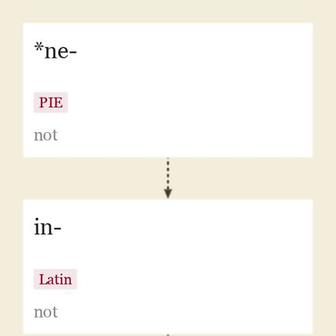Entries linking to improbity
c. 1200, prēven, pruven, proven "to try by experience or by a test or standard; evaluate; demonstrate in practice," from Old French prover, pruver "show; convince; put to the test" (11c., Modern French prouver), from Latin probare "to make good; esteem, represent as good; make credible, show, demonstrate; test, inspect; judge by trial" (source also of Spanish probar, Italian probare, and English probe), from probus "worthy, good, upright, virtuous."
This is from PIE *pro-bhwo- "being in front," from *pro-, extended form of root *per- (1) "forward," hence "in front of," + root *bhu- "to be," source also of Latin fui "I have been," futurus "about to be;" Old English beon "to be;" see be.
From early 13c. as "render certain, put out of doubt," also "establish the validity or authenticity of a will, etc." By c. 1300 as "test and find worthy, virtuous, false, etc.," also "find out, discover, ascertain; prove by argument." By mid-14c. as "check the accuracy of." The meaning "be found to be (a hero, coward, etc.) by experience or trial" is by late 14c.
The word had many more senses and broader application in Middle English than Modern English: "to experience; to strive, endeavor; act, accomplish; thrive, succeed." Also in Middle English in a now-obsolete sense of "approve, sanction, praise" (c. 1300; compare approve). Related: Proved; proven; proving. Proving ground "place used for firing cannons for making ballistics tests and testing powder" is by 1837.
word-forming element meaning "not, opposite of, without" (also im-, il-, ir- by assimilation of -n- with following consonant, a tendency which began in later Latin), from Latin in- "not," cognate with Greek an-, Old English un-, all from PIE root *ne- "not."
In Old French and Middle English often en-, but most of these forms have not survived in Modern English, and the few that do (enemy, for instance) no longer are felt as negative. The rule of thumb in English has been to use in- with obviously Latin elements, un- with native or nativized ones.
Proto-Indo-European root forming prepositions, etc., meaning "forward," and, by extension, "in front of, before, first, chief, toward, near, against," etc.
It forms all or part of: afford; approach; appropriate; approve; approximate; barbican; before; deprive; expropriate; far; first; for; for-; fore; fore-; forefather; foremost; former (adj.); forth; frame; frau; fret; Freya; fro; froward; from; furnish; furniture; further; galore; hysteron-proteron; impervious; improbity; impromptu; improve; palfrey; par (prep.); para- (1) "alongside, beyond; altered; contrary; irregular, abnormal;" paradise; pardon; paramount; paramour; parvenu; pellucid; per; per-; percent; percussion; perennial; perestroika; perfect; perfidy; perform; perfume; perfunctory; perhaps; peri-; perish; perjury; permanent; permeate; permit; pernicious; perpendicular; perpetual; perplex; persecute; persevere; perspective; perspire; persuasion; pertain; peruse; pervade; pervert; pierce; portray; postprandial; prae-; Prakrit; pre-; premier; presbyter; Presbyterian; preterite; pride; priest; primal; primary; primate; primavera; prime; primeval; primitive; primo; primogenitor; primogeniture; primordial; primus; prince; principal; principle; prior; pristine; private; privilege; privy; pro (n.2) "a consideration or argument in favor;" pro-; probably; probe; probity; problem; proceed; proclaim; prodigal; produce; profane; profess; profile; profit; profound; profuse; project; promise; prompt; prone; proof; proper; property; propinquity; prophet; prose; prostate; prosthesis; protagonist; Protean; protect; protein; Proterozoic; protest; proto-; protocol; proton; protoplasm; Protozoa; proud; prove; proverb; provide; provoke; prow; prowess; proximate; Purana; purchase; purdah; reciprocal; rapprochement; reproach; reprove; veneer.
It is the hypothetical source of/evidence for its existence is provided by: Sanskrit pari "around, about, through," parah "farther, remote, ulterior," pura "formerly, before," pra- "before, forward, forth;" Avestan pairi- "around," paro "before;" Hittite para "outside of," Greek peri "around, about, near, beyond," pera "across, beyond," paros "before," para "from beside, beyond," pro "before;" Latin pro "before, for, on behalf of, instead of," porro "forward," prae "before," per "through;" Old Church Slavonic pra-dedu "great-grandfather;" Russian pere- "through;" Lithuanian per "through;" Old Irish ire "farther," roar "enough;" Gothic faura "before," Old English fore (prep.) "before, in front of," (adv.) "before, previously," fram "forward, from," feor "to a great distance, long ago;" German vor "before, in front of;" Old Irish air- Gothic fair-, German ver-, Old English fer-, intensive prefixes.
Trends of improbity
More to Explore
updated on September 28, 2017
Trending words
Dictionary entries near improbity
imprint
imprison
imprisonment
improbability
improbable
improbity
imprompt
impromptitude
impromptu
improper
impropriety

